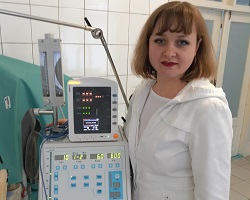Nurse anaesthetist Larysa Belykova faces the challenges of military conflict and COVID-19 in Ukraine

Larysa Belykova
The Central District Hospital in the town of Volnovakha, just 34 km from the frontline of Ukraine’s military conflict, provides specialized medical care to more than 150 000 people. In 2019, the hospital started having difficulties with oxygen supply, which is essential for surgery and intensive care units. In late 2019, WHO installed an oxygen generator at the hospital to make sure there was no disruption of life-saving care for patients. Additionally, WHO donated core equipment for washing and disinfection of medical devices in the sterilization unit.
“Volnovakha is located on the highway connecting Donetsk and Mariupol, the 2 largest cities in our province, which meant we always had many cases related to traffic accidents. In 2014, when the war started, it became much worse. First, there were servicemen and civilians wounded during fighting and shelling; then, we also had many patients injured by landmine explosions. We were familiar with demanding work, but this added an unfamiliar psychologically challenging element to it.
“I began my career at the Central District Hospital when I was 19 and chose anaesthesiology because I preferred having a hands-on approach. I have a lot of responsibility and difficult tasks, but it really allows me to show my skills.
“As nurse-anaesthetist, my working day starts at 8 in the morning when we meet as a team and receive the daily schedule of surgeries. Then I prepare my workplace and start assisting in the operating theatre. My day often ends quite late in the evening.
“I am thankful for my team. We came here together, fell in love, started our families and had children at the same time. We have shared all major life events with each other, which has made us a close-knit group, like a family.
“Now we are facing another kind of challenge – COVID-19. Fortunately, there have been no cases registered in Volnovakha so far. We are, however, preparing to treat COVID-19 patients. We have received masks, protective gowns and extensive instructions from the Ministry of Health. Every day, we have training sessions, both for health workers and local residents, on how to behave if the pandemic starts spreading here as well.
“The oxygen generator, which we received from WHO and started using in January, is helping significantly. Before that, we had to use oxygen concentrators, which were bulky and less reliable, because they depend on grid power. As we often have electricity outages in Volnovakha, I am thankful that the oxygen generator we now have is self-reliant and oxygen is readily available. We use it in operating rooms, for resuscitation, intensive care units and maternity departments.
“Due to the COVID-19 pandemic, ventilators are increasingly needed. Having an oxygen generator now, we are more confident that we will be able to assist our patients.
“Not everyone is cut out to be a nurse. This profession requires hard work, deep commitment to helping others and a strong sense of respect for both colleagues and patients. I hope our profession will receive the recognition it deserves someday.”



